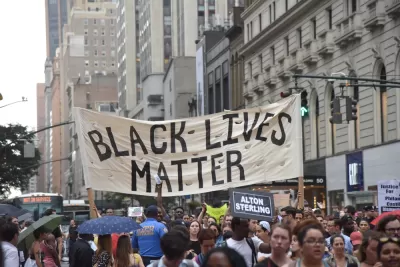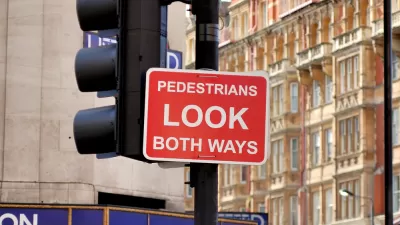Two studies bear out the idea that Black people face continued discrimination in transportation. They drive cautiously to avoid discriminatory traffic enforcement, and they're less likely to get picked up by rideshare.

Amid increased racial rhetoric, Joe Cortright calls attention to the diversity of our lived experiences, even in regular day-to-day transportation. Traffic stops are one problem area. "African-Americans are much more likely than other drivers to be pulled over for routine traffic infractions. Federal data on traffic stops show a clear difference by race: Black drivers are about 31 percent more likely to be pulled over for a traffic infraction than white drivers."
Cortright notes a recent study on transportation system performance, finding that Black drivers, on average, are more cautious than other groups, probably because they fear discriminatory enforcement. "If each year of age reduces your average speed by about three-tenths of one percent, that means that the typical black driver travels at about the same speed as a white driver who is about 26 years older. For example, a 25 year-old black driver would, according to these estimates, be expected to drive about as fast as a 51 year-old white driver."
In another study, researchers looked at rideshare services through a demographic lens. "In theory, at least one of the advantages of [...] computer-based ride-hailing services such as Lyft and Uber is that they should be more race blind."
Nevertheless, the study finds that "drivers for ride-sharing services are prone to discriminate against African Americans, making blacks wait longer for rides when they can identify the race of the ride-hailer and more frequently cancelling rides when alerted to African American-sounding names."
FULL STORY: Race & transportation: Still a long way to go

Maui's Vacation Rental Debate Turns Ugly
Verbal attacks, misinformation campaigns and fistfights plague a high-stakes debate to convert thousands of vacation rentals into long-term housing.

Planetizen Federal Action Tracker
A weekly monitor of how Trump’s orders and actions are impacting planners and planning in America.

In Urban Planning, AI Prompting Could be the New Design Thinking
Creativity has long been key to great urban design. What if we see AI as our new creative partner?

Cal Fire Chatbot Fails to Answer Basic Questions
An AI chatbot designed to provide information about wildfires can’t answer questions about evacuation orders, among other problems.

What Happens if Trump Kills Section 8?
The Trump admin aims to slash federal rental aid by nearly half and shift distribution to states. Experts warn this could spike homelessness and destabilize communities nationwide.

Sean Duffy Targets Rainbow Crosswalks in Road Safety Efforts
Despite evidence that colorful crosswalks actually improve intersection safety — and the lack of almost any crosswalks at all on the nation’s most dangerous arterial roads — U.S. Transportation Secretary Duffy is calling on states to remove them.
Urban Design for Planners 1: Software Tools
This six-course series explores essential urban design concepts using open source software and equips planners with the tools they need to participate fully in the urban design process.
Planning for Universal Design
Learn the tools for implementing Universal Design in planning regulations.
Appalachian Highlands Housing Partners
Gallatin County Department of Planning & Community Development
Heyer Gruel & Associates PA
Mpact (founded as Rail~Volution)
City of Camden Redevelopment Agency
City of Astoria
City of Portland
City of Laramie





























